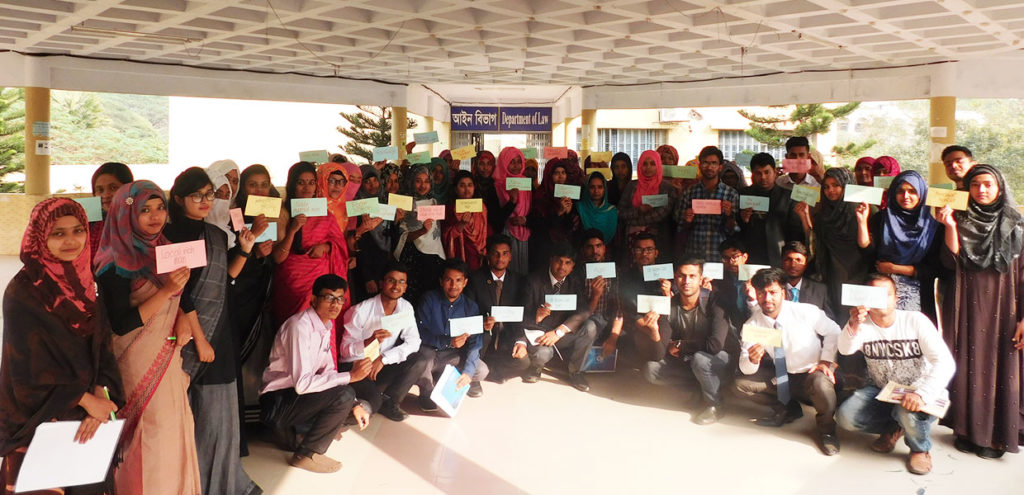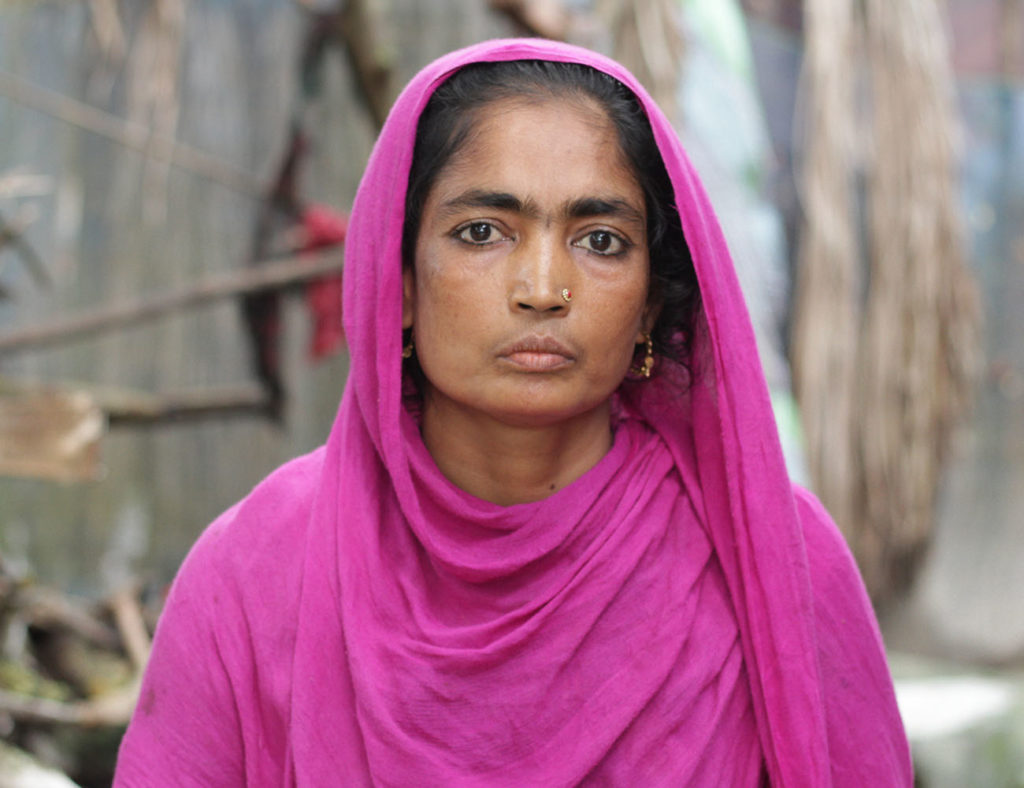Programmes and Activitieis
To contribute to the ongoing national COVID 19 response, we intend to carry out the following activities:
Activity-1: Online trainings for paralegals and mediators
During the lockdown training for paralegals – particularly those focusing on responding to family disputes, labor disputes with prioritization on cases of support to victims/ survivors of sexual and gender based violence,. The online training module will be developed, and training will be conducted from distance. To carry out these activities it will require an online infrastructural system to be in place – currently not in place at district level
Activity-2: Training on IT use and online communication:
To provide an effective BLAST will train existing staff who are familiar with face-to-face service will now take training on IT usage and online communication. BLAST will hire a trainer to train them as soon as the infrastructural system will be developed.
Activity-3: Information campaigns through social media, talk shows, radio, Facebook live
BLAST will disseminate information on legal rights and enable broader awareness campaigns around the risks of and prevention of SGBV including DV via social media i.e. Facebook live and question-answer sessions by the paralegals and staff lawyers, legal advisors, develop short videos on legal remedy through BLAST’s YouTube channels and publicize via other social media (Facebook, Twitter, Radio and private TV station).
Activity-4: Online coordination with justice and health sector actors
BLAST will communicate with relevant justice actors – including other NGOs providing legal services as well as the media and the local administration.
Activity-5: Advocacy meeting with different government authorities and service providers to make them more responsive and accountable in prevention measure of COVID 19
Online advocacy and coordination meetings with different government bodies i.e. police, UNO, DC, and ward councilors on activation of police responses, use of virtual court for legal aid clients, communication with VSCs / OCCs
Activity-6: Awareness and Information on Prevention and Protection on Rights to Health and Justice:
BLAST has already started providing legal advice on Covid-19 via popular radio channels, Facebook live events with media partners including leading newspapers, and hotline numbers included on scrolls on news broadcasts. It will continue these initiatives including localized district level events cascading these conversations down into communities.
Activity-7: Broadcast information related to Helpline and Referral Services, through cable network:
BLAST will broadcast information and create awareness related to the covid response, and prepare and develop more project staff, paralegal, and self-help groups who will support 24/7 through Helpline number and act as a coordinator with the local administration and legal authorities in case of emergency. BLAST will also liaise with local cable network channels those will disseminate information on Covid-19, and BLAST’s online activities.
Activity-8: Online communications and legal rights awareness materials
Term Podcast is a Community based legal awareness programs and information campaigns around rights remedies and available services – have been a critical component of building demand for justice services. In the absence of courtyard meeting locations, s, we plan to use our mobile clinics, which travel to remote locations, paralegals, and direct calls and SMS as well as podcasts and additional content on our, Sromik Jiggasya App and to include advice and guidance on SGBV prevention/ protection, as well as on safeguards on arrest and detention, family and criminal law.
Activity-9: Expand hotline, set up call center to expand for legal advice and referral
With all in person services suspended, we are only able to provide advice and assistance by phone or email. existing We are in the process of securing a low tech expansion of our helpline, by providing additional sim cars to a core legal team in head office and district offices, so that they can communicate with existing clients and respond to new callers . We are also in the process of identifying how to establish call center services, and setting up attained team to provide legal services through these hotlines.
Activity-10: Tech support for online legal empowerment and advocacy
To enable these online services, we need to ensure adequate equipment, internet connections and training for our core legal aid staff (paralegals, lawyers. In some remote areas – in particular the CHT where internet speed is slow, and it is essential to have good internet connectivity. So, that people can call BLAST with uninterrupted service and they become satisfied with the services.
Activity-10: Holding online mediations during the lockdown
BLAST has successful undertaken office based (as opposed to community) mediation to resolve thousands of family and labor disputes, recovering among others’ women’s entitlements to post divorce maintenance, and compensation for workplace deaths and injuries. While in person mediations are not possible in the current context, online mediation (through low tech means, bilateral telephone calls by the trained mediator with each party) has taken place – and it is possible that mediation may also occur via more complex teleconferencing or videoconferencing where appropriate.
Activity-11: Communicate with clients for needs assessment and to provide information related to COVID-19 and S GBV through mobile and digital communications
Given client information is accessible to each district office, direct calls will be made to disseminate general information on Covid-19 prevention and response, and to assist with any information referrals needed.
Activity-12: Form a committee at the divisional level under the CIDV platform
A divisional-level committee will be formed under the CIDV platform. This committee will be a joint initiative by the government and civil society organizations. The role of this committee will mainly include overseeing the implementation of the Domestic Violence Act, and identifying any existing loopholes in the law and finding way forward for necessary reform. The committee will meet quarterly to discuss progress, coordination, challenges and implementation strategies.
Activity-13: Strengthen the DURBAR network
This activity will focus on strengthening the existing DURBAR network. Bimonthly meetings of the network will be arranged at regional level, where the members will lead discussions on issues of domestic violence and gender-based violence, as well as strategies for enhancing liaisons with different service providers, in order to ensure that community members receive prompt and gender-friendly services.
Activity-14: Develop online training module on mental health and psychosocial counselling
There is a need for appropriate knowledge materials and guidelines on services pertaining to mental health and psychosocial counselling. These knowledge products will help frontline service providers in their properly executing their responsibilities. A training module on mental health and psychosocial counselling will put together all necessary information required to build capacity of the service providers in engaging with clients. This module will be available as an online version to make it more accessible for service providers.
Activity-15: Engage an adviser for mental health and psychosocial counselling support
Many of the activities under the project include providing mental health and psychosocial counselling support to the beneficiaries. In order to ensure that the activities are being implemented correctly, following standard guidelines on ethics and client sensitivities, an adviser will be engaged. This person will be a consultant who has strong experience in the field of mental health and psychosocial counselling support.
Activity-16: Set up quarantine and isolation centers for frontline health workers
Many frontline health workers of Gonoshasthata Kendra and other organizations interacts directly in person with members of the Rohingya community. But there have insufficient protection and treatment provision for the health workers at Cox’s Bazar. To ensure that they have access to prompt and proper treatment in case of need, quarantine and isolation centers will be set up. This way, any affected worker will have the possibility of getting immediate support.
Activity-17: Construct WASH facilities
In order to contain the spread of the coronavirus, maintaining proper health guidelines is imperative. However, there is a shortage of WASH facilities in the camps. Under this activity, hygienic water distribution and hand washing points will be set up at homes, schools, health centers and public facilities, in two camps.
Activity-18: Train volunteers to engage in awareness campaigns
A major component of this project is to create awareness among the community, especially on issues pertaining to health and social distancing protocols. For this, a group of volunteers need to be trained and mobilised to engage with community members. This group will include volunteers from both the Rohingya and the Host community. The training will focus on crowd control, maintaining safety and social distancing protocols and awareness on information pertaining to Covis-19.
Expected Results
- Access to justice for individuals and communities unable to seek legal protection due to through the online legal services during and after ‘general holiday’ while govt and non-got offices are only working online


